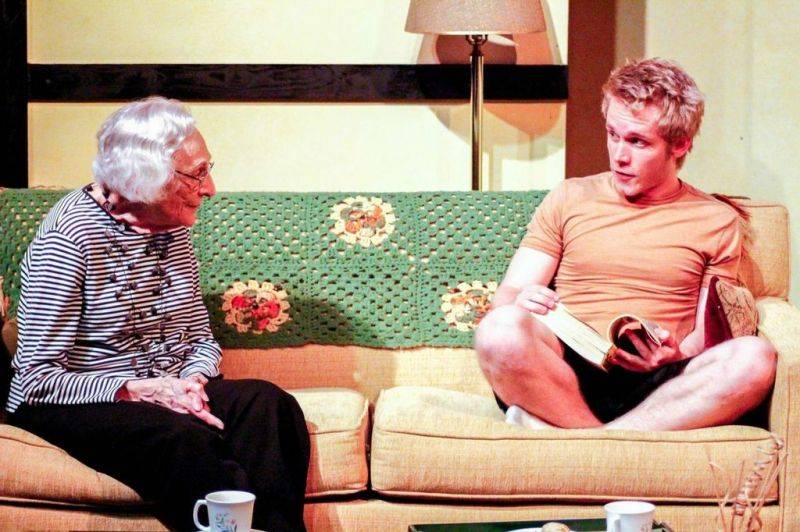
4000 Miles concerns the shared experiences of one adrift twenty-something man named Leo and his ninety-one-year-old grandmother, Vera. Leo arrives at Vera’s apartment in Manhattan at three in the morning, fresh from a cross-country journey on his bicycle. The audience is aware that Leo has undergone some trauma during the trip, but doesn’t find out the specifics until later in the production.
The first thing that struck me was the physicality of the actors. In the role of Leo, Casey Thiel delivers his lines with emotion and visceral movements, no matter his location on stage. Inside his grandma’s apartment, he shows familiarity and comfort curling up on the couch. Later, he shows his childish nature sitting cross-legged with a computer during an online chat. As Leo, Thiel also has great, authentic reactions in response to seemingly off-the-wall comments from his grandmother.
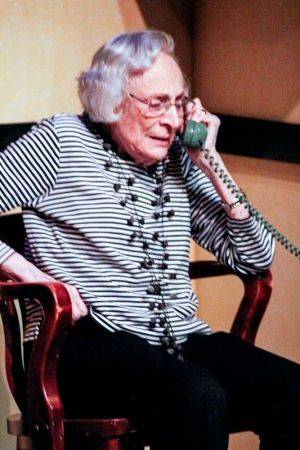 Although Celebration Company veteran Janice Rothbaum is nearing the age of her character, Vera, she seems to have to dial back her energy, implying that Vera is a much frailer nonagenarian than she. Vera is a pleasant woman, but she also speaks about sexual matters with a matter-of-fact attitude that takes younger people by surprise. Rothbaum performs perfectly, knowing exactly how and when to extract laughter from the audience. Helping Rothbaum in her role are some of director Sara Boland-Taylor’s design choices, including a rotary phone and a prominent phone book. Who but an elderly woman named Vera would have a phone book? And isn’t it a truth universally acknowledged that only the elderly have the constitution to cope with a rotary phone?
Although Celebration Company veteran Janice Rothbaum is nearing the age of her character, Vera, she seems to have to dial back her energy, implying that Vera is a much frailer nonagenarian than she. Vera is a pleasant woman, but she also speaks about sexual matters with a matter-of-fact attitude that takes younger people by surprise. Rothbaum performs perfectly, knowing exactly how and when to extract laughter from the audience. Helping Rothbaum in her role are some of director Sara Boland-Taylor’s design choices, including a rotary phone and a prominent phone book. Who but an elderly woman named Vera would have a phone book? And isn’t it a truth universally acknowledged that only the elderly have the constitution to cope with a rotary phone?
Another shining performance in 4000 Miles is given by Sally Hamer, who portrays Leo’s girlfriend, Bec. Hamer has a way of saying her lines that makes them seem completely unscripted. Her timing and body language are so fluid, and the audience can sense her frustration with Leo’s idealistic expectations.
Although four thousand miles is the distance Leo travels on his bike, it also seems to be the emotional distance between Vera and himself. Grandparents are precious to grandchildren, and usually the opposite is also true. However, neither Vera nor Leo treats the other as anything special. It seems strange that Leo looks at books around the apartment while his grandmother is speaking to him. Why doesn’t he relish his time with her? Later, she carefully folds his clothes, and then as soon as she leaves the room, he quickly crumples them up with no regard for her effort. He also grabs objects out of her hands, not considering her safety.
It goes the other way as well. Vera doesn’t emote a grandmotherly warmth for Leo, making the audience wonder if she really wants him to stay. There seems to be a marked lack of closeness between them, especially when he takes an interest in his grandpa. She doesn’t seem pleased or disappointed, just ambivalent. Portraying Leo and Vera in this way is a compelling choice by Boland-Taylor.
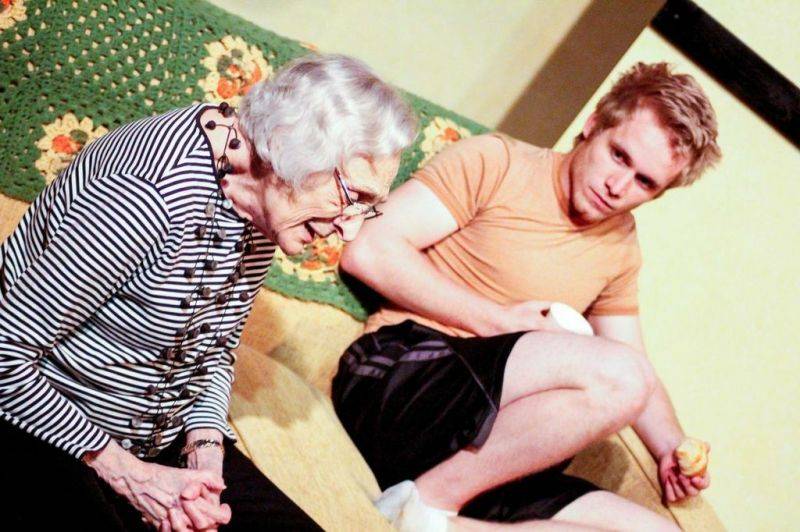
Offering a contrast to this dubious relationship is Amanda, a girl Leo brings back to the apartment. Amanda, portrayed by Wen Bu, may be a drunk floozy, but even she sees how strange it is that Leo doesn’t take much interest in his grandma.
Another interesting choice by Boland-Taylor was having a pivotal point in the play—Leo’s monologue describing the tragedy he endured—delivered in near darkness. On one hand, it helps the audience really focus on the words. On the other hand, it seems like a wasted opportunity for the audience to witness some powerful acting. Having Leo talk in this way is a little like typing your secrets on a typewriter with no ribbon: much less of an impression is made.
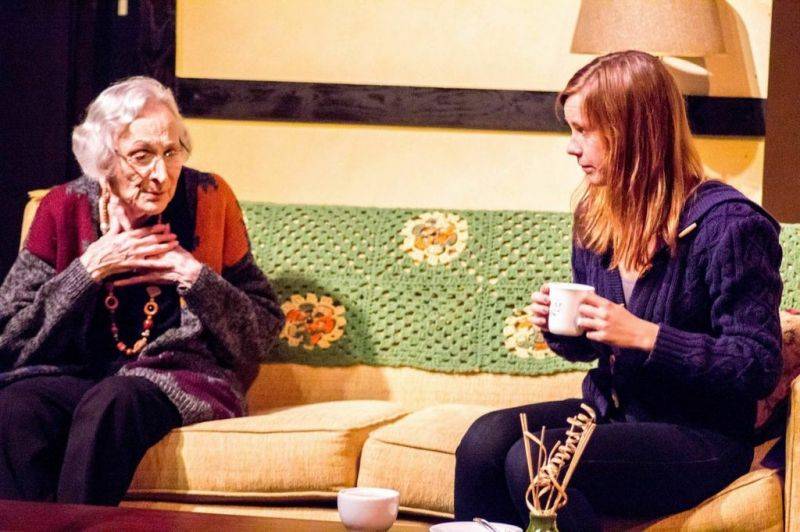
The production is very cohesive in terms of set, costumes, lighting, props, and music. However, some aspects really stand out. The set is cozy, with dark wood moulding and warm, yellow walls, yet the walls are also completely bare. There is also transition music between scenes, some of which appropriate; at other times it sounds like the soundtrack to Metropolis or the opening credits of Futurama. The lighting is fine, except for when the characters are on the couch and their faces appear a little muddy and dark. Perhaps (and hopefully) this was adjusted in time for opening night since, due to limitations of the set and/or blocking, the actors are on the couch quite often. The actors’ movements are somewhat stagnant by the end of the show. Either people are standing around, or they are sitting on the couch. It would have been nice to have another seating arrangement, or at least an armchair to provide variety. Most of these “flaws” are barely noticeable, however, and would only be apparent to someone looking for them.
4000 Miles promised to be heartwarming, and it is to some extent. In other ways, though, it is more cathartic. Strong performances make this a show worth seeing. 4000 Miles, presented by the Celebration Company at the Station Theatre, runs July 31st through August 9th. All performances begin at 8:00 PM. Call 384-4000 to reserve tickets, or reserve them online at stationtheatre.com.
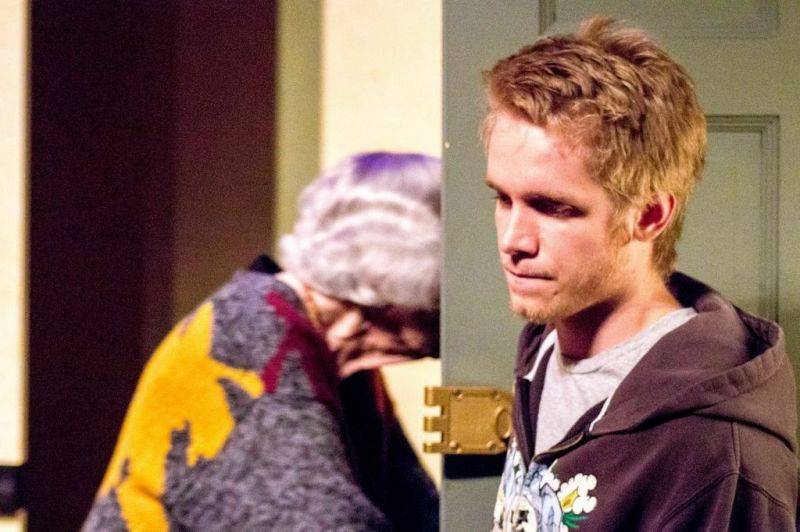
Photos courtesy of Sam Logan.








